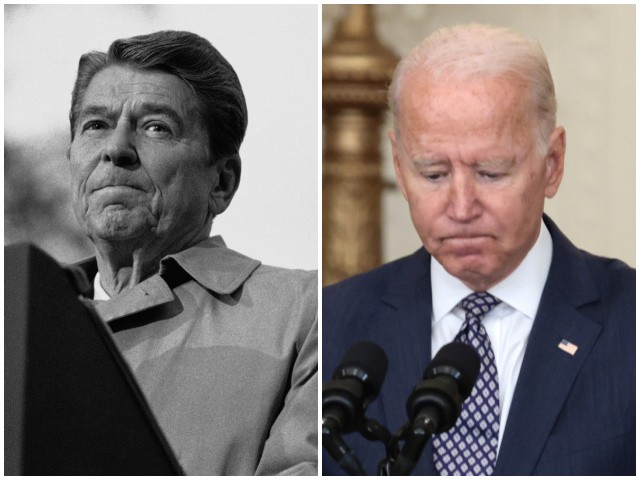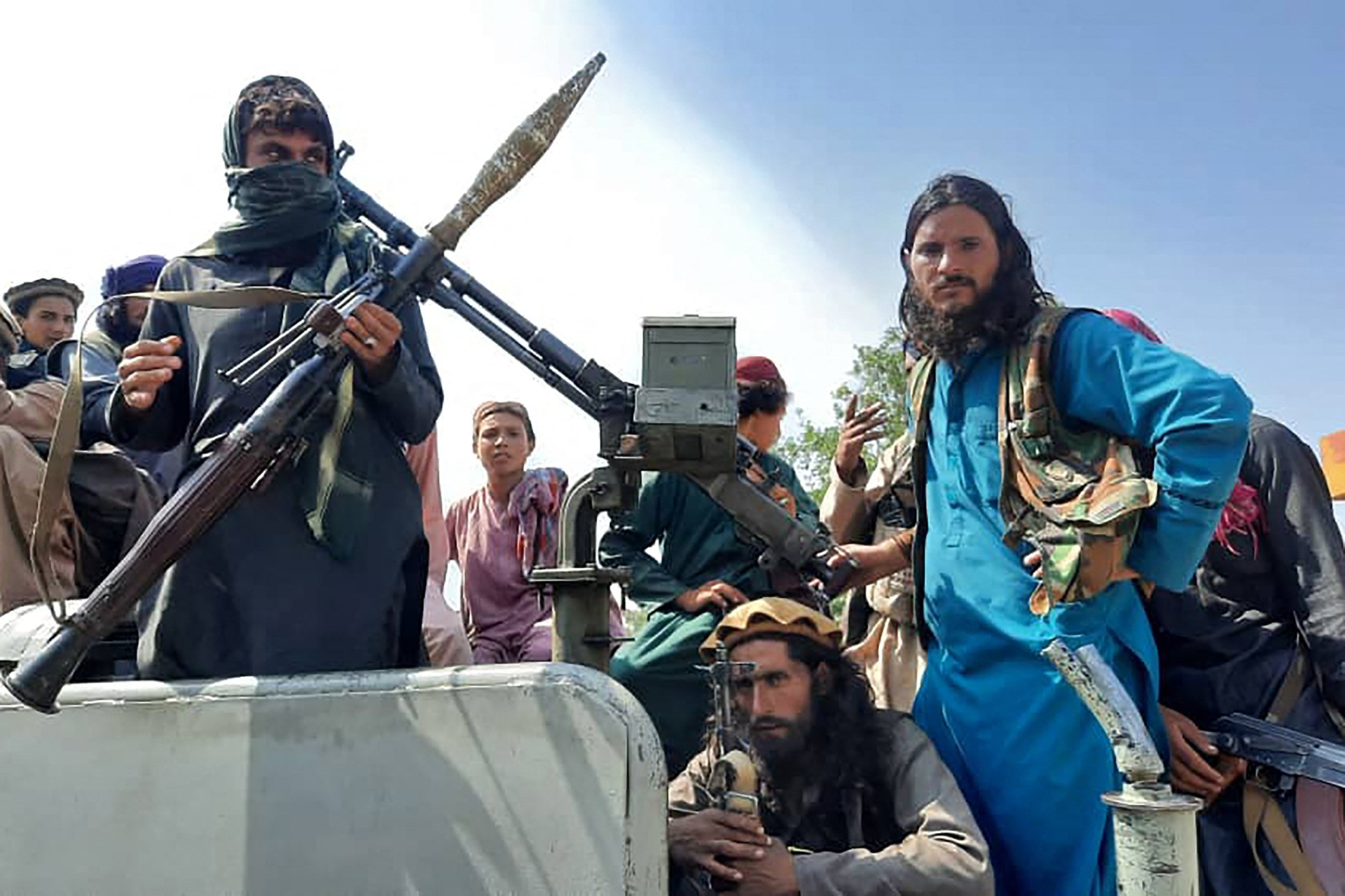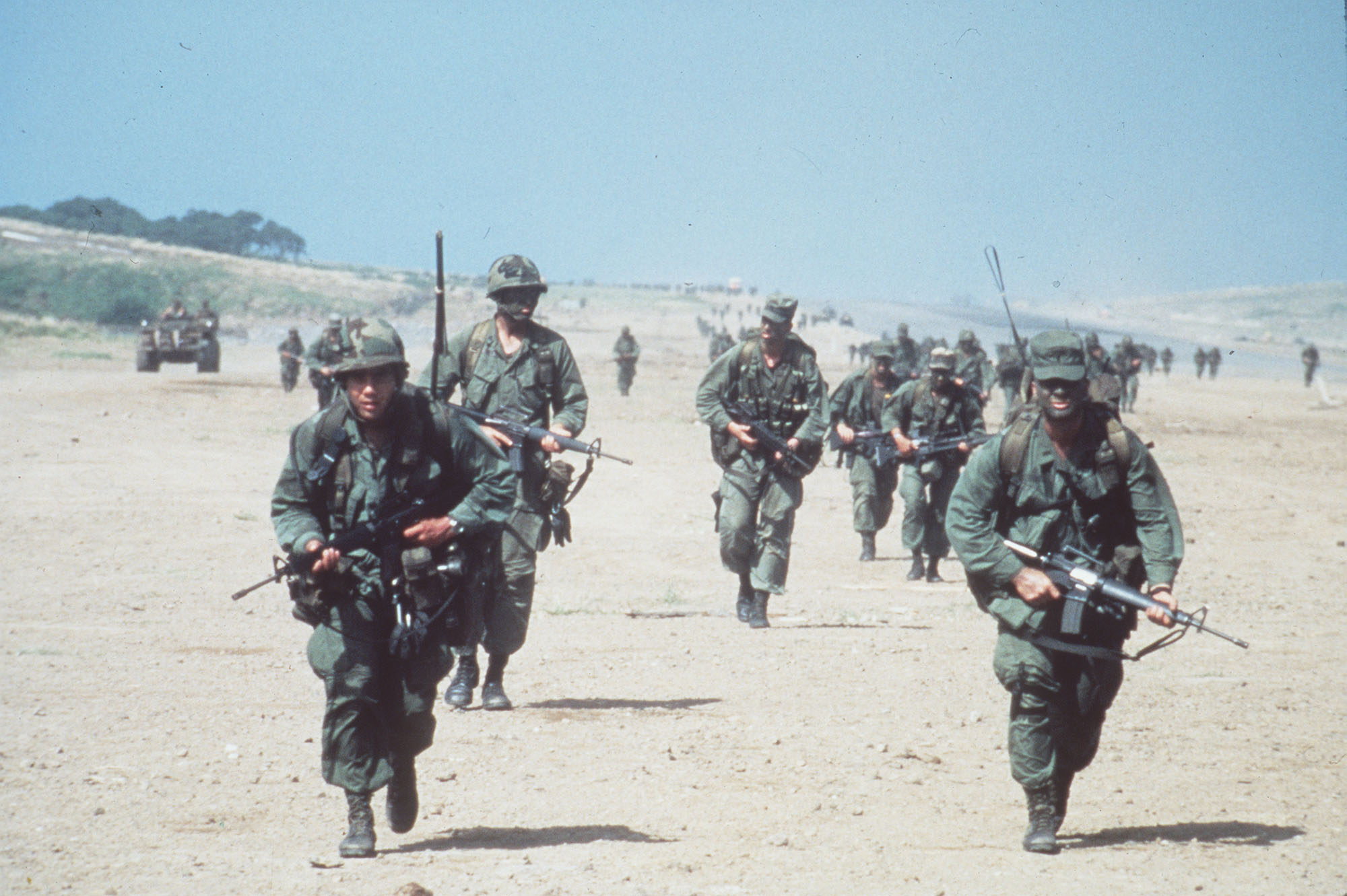
In view of the ongoing Kabul Debacle, it’s obvious that Joe Biden needs some pointers on leadership and management of foreign policy and national security.
Even if one agrees that it was time to get out of Afghanistan—and 70 percent of Americans did, at least until a few days ago, though the polls have since softened—it’s plain to see that the Biden administration bungled the withdrawal. Under the right circumstances, an orderly and complete evacuation can be a good idea, but that’s a much different thing than a chaotic bug out that leaves people behind.
Now the whole wide world can see that the Biden administration was caught by surprise. The White House didn’t foresee the rapidity of the Afghan government’s collapse, and it was slow-witted and flat-footed in its response to the Taliban victory.
Indeed, the situation is so bad that even the normally pro-Biden Main Stream Media is now on the hunt for Democratic scapegoats. Journos realize that blaming everything on Donald Trump can only go so far.
Bespeaking this new MSM tone, we see CNN’s Jake Tapper scowling every afternoon, and this disturbing headline in the August 17 New York Times: “Intelligence Warned of Afghan Military Collapse, Despite Biden’s Assurances.” Oh, and this nastygram of a header from Politico: “‘They were sitting on their hands’: Insiders say Biden’s team wasted precious time on evacuating Afghans.”
For the sake of those trapped in Afghanistan and for those who have gone into harm’s way to rescue them, let’s pray for the success of the mission.
And yet at the same time, we have to realize that America has already lost face, and that hurts our alliances in Europe, in the Middle East, and in Asia.

A U.S. Marine grabs an infant over a fence of barbed wire during an evacuation at Hamid Karzai International Airport in Kabul on August 19, 2021. (Photo courtesy of Omar Haidiri/AFP via Getty Images)

Taliban fighters sit over a vehicle on a street in Laghman province on August 15, 2021. (AFP via Getty Images)
Perhaps Biden is too old to learn lessons, and yet the rest of us might see this fiasco as a teachable moment. As we look around for learning materials, we would do well to study the epochal foreign-policy successes of the last Republican president to win two national landslides — a commander-in-chief who was both popular and effective in his eight years in office. That would be our 40th president, Ronald Reagan, for whom this author worked in various capacities on his presidential campaigns and in his White House, from 1979 to 1984.
What would the Gipper do? Here are at least five lessons Reagan could convey to the current occupant of the Oval Office.
Reagan Lesson Number One: Peace Through Strength
Let’s start by recalling the Gipper’s embrace of the concept of “peace through strength.” As he said in his acceptance speech to the Republican National Convention on July 17, 1980, “We know only too well that war comes not when the forces of freedom are strong, but when they are weak. It is then that tyrants are tempted.”
In fact, “peace through strength” is an ancient concept, often associated with the Roman military strategist Vegetius, who wrote in the 4th century, Si vis pacem, para bellum. That is, “If you want peace, prepare for war.”
Being the Great Communicator that he was, Reagan found clever ways to illustrate this wisdom. As he said on August 18, 1980, “The great American humorist, Will Rogers, some years ago had an answer for those who believed that strength invited war. Rogers said, ‘I’ve never seen anyone insult Jack Dempsey.’” Dempsey was the heavyweight boxing champion of the world from 1919 until 1926.
Reagan’s strong approach was one reason why the Iranian hostage crisis came to such an abrupt end on the very day, in fact, that he was sworn in as president. The hostage crisis had vexed and humiliated the 39th president, Jimmy Carter, for more than a year, and yet it all came to an end, as the Iranians released our people with the beginning of Reagan’s presidency. How come? Why did the Iranians let our people go? the ayatollahs, having messed with Carter, simply didn’t dare mess with the hawkish Reagan.

An American hostage being paraded before the cameras by his Iranian captors. Following the Iranian revolution over fifty American hostages were taken and only released after four hundred and forty-four days. (Photo by MPI/Getty Images)
Once in office, Reagan knew that the big challenge was the Cold War rivalry with the Soviet Union. And so he ordered a big defense buildup. And just as importantly, he persuaded Congress—mostly controlled by the Democrats in those days—to go along. We can pause to observe: A president simply making speeches doesn’t mean much, but a president who can actually get bills through Congress means a lot. So that’s how defense spending more than doubled during Reagan’s time in office, from $143 billion in 1980 to $321 billion in 1989. (And yet interestingly, because the economy grew so much thanks to Reagan’s pro-growth tax cuts, the defense budget’s share of the overall economy actually declined.)
One result of Reagan’s peace-through-strength policy was that our alliances stayed together. Our friends knew that Uncle Sam had their back.
At the same time, Reagan stepped up the pressure on the Soviets, launching the Strategic Defense Initiative aimed at shielding America from the Soviet nuclear threat. Liberal critics—including a certain Democratic senator from Delaware—opposed Reagan, and yet the Soviets knew they were getting bested in the hard deliverables of military strength. And so they waved, in effect, the white flag. And the rest is history. The Soviet Union teetered and then collapsed.
So now to today, when that certain senator is now our uncertain president, and it doesn’t appear that anyone is afraid of him. Donald Trump Jr. nailed the peace-through-strength dynamic when he tweeted a picture of flamboyant comedian Benito Skinner, the star of a campy new White House video. Trump’s snarky commentary: “I can’t believe the Taliban isn’t terrified of the Biden regime.”
— Donald Trump Jr. (@DonaldJTrumpJr) August 17, 2021
Reagan Lesson Number Two: No Half-Hearted Wars
Back in 1980, candidate Reagan spoke to the Veterans of Foreign Wars, declaring, “Let us tell those who fought in that war [Vietnam] that we will never again ask our men to fight and possibly die in a war our government is afraid to win.” As the Washington Post reported, with these words, “Reagan brought most of the 5,000 persons in attendance to their feet.”
That’s the way you do it: If you go in, go all the way.
And that’s exactly what Reagan did on October 25, 1983, when he ordered Operation Urgent Fury, the invasion and liberation of the Caribbean island-nation of Grenada, which had been falling under the control of Cuban communists. The mission was a great success, so overwhelming that it was over in four days. And while it was not without cost—19 American soldiers died—it saved American lives on the island and transformed the geopolitics of the region, keeping communism in check.

A patrol of U. S. Marines during the invasion of Grenada in October 1983. (AP-Photo/HO/DOD)
Fortunately, Team Reagan realized that it was on to something intellectually, and so the Reaganites sought to imprint their better thinking on the foreign policy establishment.
A year after Grenada, in November 1984, U.S. Secretary of Defense Caspar Weinberger—himself a World War Two veteran and Reagan’s great partner in peace through strength—delivered a speech to the National Press Club outlining what came to be known as the Weinberger Doctrine, which identified six points to be used in evaluating any possible military action.
The six points of the Weinberger Doctrine are so valuable that they are worth repeating in full:
1. The United States should not commit forces to combat unless the vital national interests of the United States or its allies are involved.
2. U.S. troops should only be committed wholeheartedly and with the clear intention of winning. Otherwise, troops should not be committed
3. U.S. combat troops should be committed only with clearly defined political and military objectives and with the capacity to accomplish those objectives.
4. The relationship between the objectives and the size and composition of the forces committed should be continually reassessed and adjusted if necessary.
5. U.S. troops should not be committed to battle without a “reasonable assurance” of the support of U.S. public opinion and Congress.
6. The commitment of U.S. troops should be considered only as a last resort.
In Weinberger’s lawyerly words, we can hear a restatement of Reagan’s pledge to the Veterans of Foreign Wars four years earlier: We will never again ask our men to fight and possibly die in a war our government is afraid to win.
Indeed, if we think about the wisdom of Reagan and Weinberger, we realize that if we had followed their thinking, we would have gone into Afghanistan in 2001 to destroy the Taliban, and then, having accomplished that mission, we would have gotten out. Think of how much grief that would have saved everyone, including the Afghans.
As for the American interventions in Iraq in 2003 and Libya in 2011, there’s no way that those wars of choice would have passed the Reagan-Weinberger test.

Defense Secretary Caspar Weinberger applauds President Reagan as he arrives in the East Room, Washington. (AP Photo/Charles Tasnadi)
Reagan Lesson Number Three: The Reagan Doctrine
We might add that Reagan had other successful foreign policies. For those situations where he wanted to have an impact short of war—and there were many—he found effective ways of operating behind the scenes using covert aid, not overt troops.
This was known as the Reagan Doctrine, and it animated American success against communism in Nicaragua, against communism in Poland, and, yes, against communism in Afghanistan.
Oh, and Reagan had a sly corollary to his doctrine: When confronting two hostile powers, Iraq and Iran, he armed both sides. All the better to let the two hostiles fight each other, thereby making each of them less of a threat to the U.S. and its allies.
Reagan Lesson Number Four: Prepare for War, But Search for Peace
Reagan understood that the purpose of peace through strength was to have both strength and peace. And so, he figured that if we had the strength we needed, we could afford to negotiate with an eye toward peace.
Indeed, in that 1980 speech to the Veterans of Foreign Wars, Reagan, having already emphasized the sword of strong defense, held out the olive branch as well: “I think continued negotiation with the Soviet Union is essential.” But again, only from a position of strength: “It is important also that the Soviets know we are going about the business of restoring our margin of safety pending an agreement by both sides to limit various kinds of weapons.”

President Ronald Reagan, left, and Soviet leader Mikhail Gorbachev, right, meet for the first time at the villa Fleur D’Eau at Versoix near Geneva, on Tuesday, November 19, 1985. (AP Photo/Scott Stewart)
Interestingly, Reagan also made the first tentative moves toward the normalization of relations with Vietnam, sending retired Gen. John W. Vessey, who had been his pick to chair the Joint Chiefs of Staff, to Vietnam to commence the sad but necessary work of accounting for Americans still missing in action. Thus began a decade-long process that ended with the resumption of normal relations with Vietnam.
Reagan Lesson Number Five: Know When to Cut Your Losses
To be sure, not everything Reagan did was a success. In 1982, he sent U.S. troops to Lebanon as part of a United Nations peacekeeping force. Unfortunately, the mission was attacked by terrorists on October 23, 1983, when a Hezbollah truck bomber rammed the Marine barracks, killing 241 U.S. servicemen.
The U.S. struck back hard; for instance, the battleship New Jersey was called out of mothballs to shell Hezbollah positions. And yet it was obvious to Reagan that the American mission in Lebanon was not sustainable, and so the U.S. withdrew in an orderly manner. The last U.S. troops were gone by February 1984, never to return, even as other U.N. forces remained. Yes, Lebanon was a tragic mistake, and yet at least it was never a quagmire.

Smoke rises from the U.S. Marines headquarters near the Beirut International Airport, after it was destroyed by a suicide bomber driving a truck on October 23, 1983. (AFP via Getty Images)

A U.S. Marine CH-53 helicopter is about to lift a net full of military gear in Southern Beirut, Lebanon, February 23, 1984. Some 1,300 Marines were withdrawn from Lebanon on orders of President Ronald Reagan. (AP Photo/Mell)
So will Biden learn these lessons? That remains to be seen. All we know is that he didn’t learn them the first time, when he served as a senator during the Reagan presidency.
For his part, Reagan was inclined to be hopeful about people. As he said to the 1992 Republican convention, “May all of you as Americans never forget your heroic origins, never fail to seek Divine guidance, and never lose your natural God-given optimism.” It was that same optimism, of course, that made him think that we could indeed make America great again. And it was that optimism that powered him to glory.
Yet still, Reagan was always the realist. Going back to his days running the Screen Actors Guild, he had to be good at judging people. And we can see that in that gracious and optimistic quote from three decades ago that he wasn’t talking about everyone. And not specifically about Joe Biden, who was a spectacular opponent of Reagan on many key matters, foreign and domestic.
Indeed, Reagan took notice of Biden in his diary entry, dated June 15, 1987: “He’s smooth but pure demagogue—out to save America from the Reagan doctrine.”

Sen. Joseph Biden, D-Del., holds a Capitol Hill news conference in Washington, March 30, 1983, criticizing President Reagan’s arming of NATO allies in Europe. (AP Photo/Ron Edmonds)
So with Biden in mind, we can recall that Reagan also often said, “Trust, but verify.”
And when it comes to Joe Biden today, the rest of us, mindful of Reagan’s enduring wisdom, should focus first on verification. Then we’ll see about what’s left to trust.
 RSS Feed
RSS Feed















 August 22nd, 2021
August 22nd, 2021  Awake Goy
Awake Goy  Posted in
Posted in  Tags:
Tags: 













